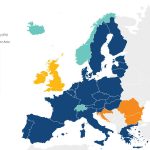SPECIAL REPORTS
Date: 23 July 2019 Author: Michał Torz
“Better Than Expected”: Remarks on Romania’s Presidency of the European Council
Romanian President Klaus Iohannis said his country’s rotating presidency of the EU Council was “better than expected,” a remarkable comment that came from the incumbent head of state standing in opposition to Romania’s current government. During its six-month mandate, Romania closed 90 legislative dossiers that led to adopting new legislation. And this was all achieved by a country that has been sharply criticized for backsliding the rule of law. Romania’s presidency overlapped with the tough political period while its success will undoubtedly be helpful for the government before the next elections.
- Romania has for years struggled with internal problems, with the government facing stiff resistance from the opposition, a large part of Romanian society and the European Commission, the last of which seems most important in the context of Bucharest’s EU presidency. Romanian authorities came under fire amid legislative amendments that would allegedly foster corruption in the country.
- Romania’s six-month presidency of the Council of the European Union is now said to be nothing more but a matter of prestige, but Bucharest managed to show that it is possible to fulfill adequate duties actively. This is evidenced by figures, depicting that Romania successfully passed as many as 90 legislative amendments and reforms within six months.
- • Romanian Social Democratic Party (PSD), which forms the ruling coalition, inflicted a slight loss in the European Parliament elections in May this year. What turned out to be a far more sweeping defeat were the results of the referendum called by Klaus Iohannis, in which Romanian citizens backed a ban on the government having powers to change judicial legislation, claiming such a step would nourish corruption in the country. The success of the presidency may surge as a life-saving solution to the government before the next election, even despite the fact that its leader was imprisoned for corrupt practices.
 THE PRESIDENT OF ROMANIA KLAUS IOHANNIS DURING THE INAUGURATION OF THE PRESIDENCY OF ROMANIA IN THE EUROPEAN COUNCIL source: ROMANIA MFA
THE PRESIDENT OF ROMANIA KLAUS IOHANNIS DURING THE INAUGURATION OF THE PRESIDENCY OF ROMANIA IN THE EUROPEAN COUNCIL source: ROMANIA MFARomanian mandate clouded by mass protests
Romania took the EU presidency baton from Austria on January 1, 2019. This was a prestigious issue for Bucharest, and so this is the case every time when a new EU member state is entrusted with a similar task (Romania joined the European Union in 2007). Generally speaking, with the country having been at the time in a tough situation, Romania’s presidency failed to arise burning enthusiasm. To better understand this phenomenon, one should trace back what happened at least a few years before. Romania’s ruling coalition of the Social Democratic Party (PSD) and the Alliance of Liberals and Democrats (ALDE) has grappled with internal problems since it came to power. They refer to controversial amendments to the Romanian criminal code and proposed judiciary reforms. Both came under fire from a part of Romanian citizens and representatives of EU institutions, with the latter being particularly relevant in the context of Bucharest’s rotating presidency.
Starting from the beginning of 2016, a wave of mass demonstrations erupted in both Bucharest and other major Romanian cities. What triggered the biggest protests in Romania was a plan to grant amnesty to people who serve less harsh criminal sentences , including these for corruption. Also, Romanian lawmakers stipulated that corruption cases over €45,000 be subject to punishment. State authorities formally sought to take action to solve the problem of prison overcrowding, but unofficial reports said Romania painted itself into a corner while combatting corruption. And there may be a grain of truth in it. For instance, offering a public position to a party member carries a penalty of prison. Naturally, this is worthwhile to be condemned but do the other EU Member States follow the similar and frequent practice of granting public positions to political allies?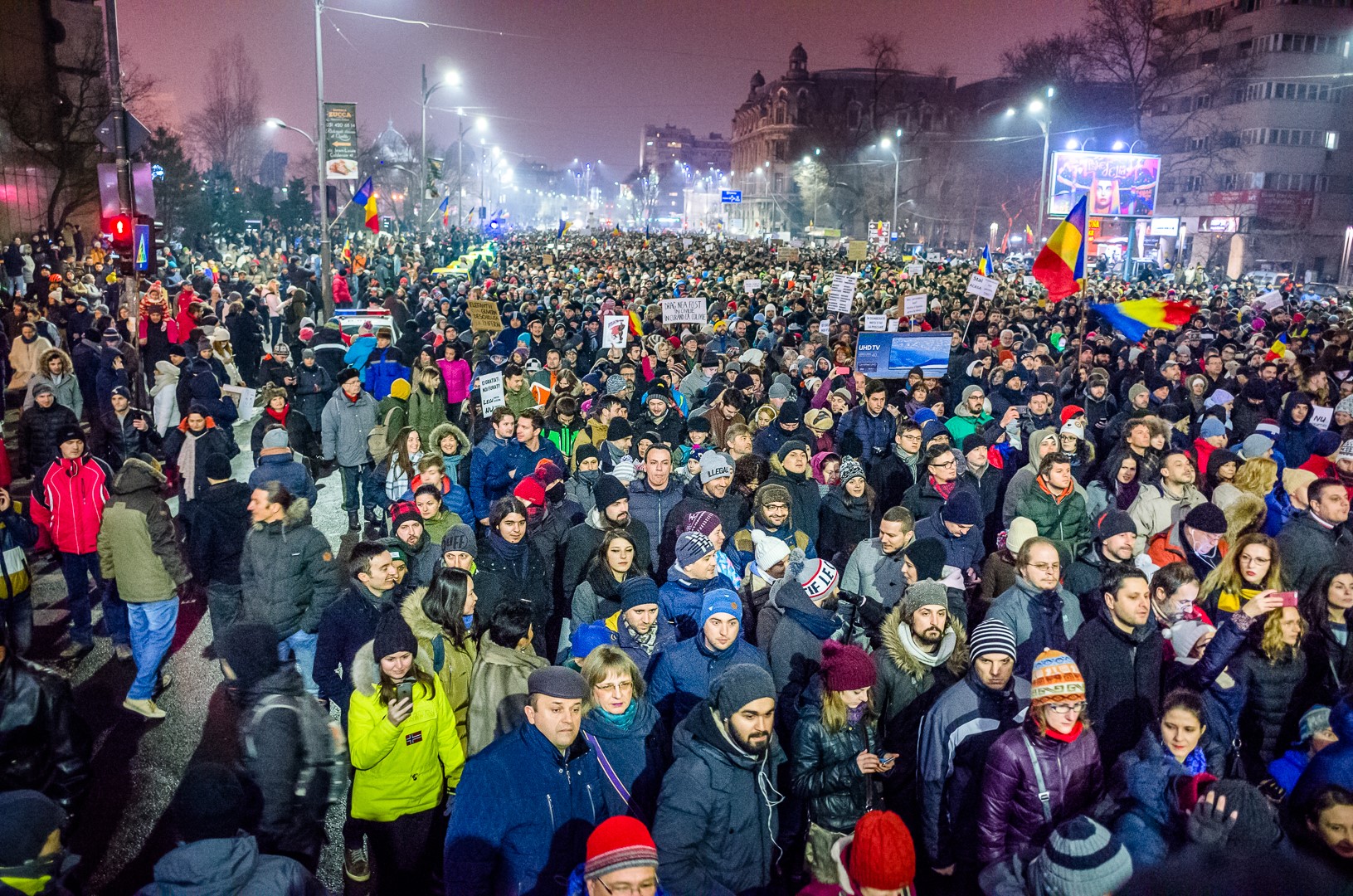 ANTI-GOVERNMENT DEMONSTRATION IN BUCHAREST, JANUARY 2017. source: WIKIPEDIA.ORG
ANTI-GOVERNMENT DEMONSTRATION IN BUCHAREST, JANUARY 2017. source: WIKIPEDIA.ORGBut there is more to the amendments to the Romanian legal system than meets the eye because it personally affected the leader of the country’s ruling party. Liviu Dragnea was given a suspended jail sentence for electoral fraud. Recent proposal to pass amendments to the Romanian criminal code raised the ire of society as new regulations were to prevent the leader of the Social Democratic Party from being sent behind bars. A few years ago, Dragnea secure state salaries for his fellow party members, which made Romania’s treasury incur losses of slightly less than the suggested sum of €45,000. In late May, the politician was sentenced to three and a half years in prison. But people who took to the streets of several Romanian cities could not get to know about this fact.
Support Us
If content prepared by Warsaw Institute team is useful for you, please support our actions. Donations from private persons are necessary for the continuation of our mission.
Let’s recall what happened a few years ago. The Romanian government came under mounting pressure from the public, which negatively affected its functioning and led to several dismissals triggered by some intra-party decisions. What is meaningful is that Romania has changed its prime minister three times since parliamentary elections took place in 2016. After his four-month rule over the country, Sorin Grindeanu stepped down and was replaced by Mihail Tudose, with the latter managing to wield authority only a day longer than his predecessor. Another Romanian prime minister was Mihail Fifor who shortly served as an interim head of government. In January 2018, Viorica Dancila was named Romania’s next prime minister, and she has been in office until now.
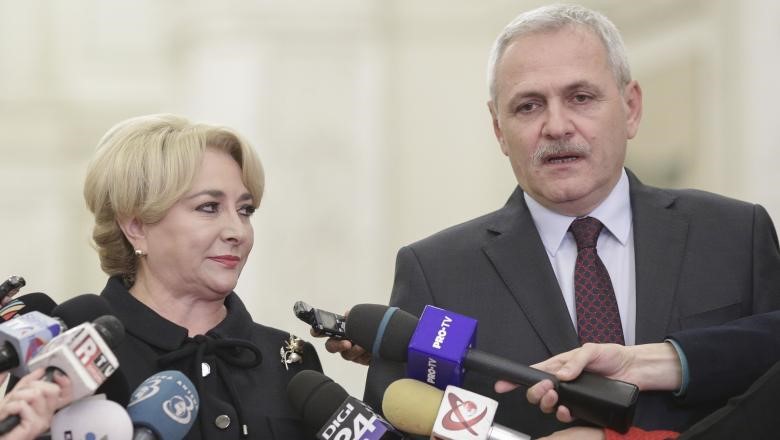 LEADER OF THE SOCIAL DEMOCRATIC PARTY (PSD) LIVIU DRAGNEA AND PRIME MINISTER VIORICA DANCILA. FEW COULD HAVE IMAGINED THAT DANCILA, REFERRED TO AS DRAGNEA’S PUPPET, WOULD EVENTUALLY SURGE AS THE PARTY’S MOST PROMINENT FIGURE. source: DIGI24.RO
LEADER OF THE SOCIAL DEMOCRATIC PARTY (PSD) LIVIU DRAGNEA AND PRIME MINISTER VIORICA DANCILA. FEW COULD HAVE IMAGINED THAT DANCILA, REFERRED TO AS DRAGNEA’S PUPPET, WOULD EVENTUALLY SURGE AS THE PARTY’S MOST PROMINENT FIGURE. source: DIGI24.ROA great countdown
Although the political situation within the government was normalized, further problems appeared right before the start of the Romanian presidency. In early November 2018, Romania’s EU Affairs Minister Victor Negrescu handed in his resignation amid increasing difficulties that had arisen while Bucharest was getting ready to assume the EU rotating presidency. And if this were not enough, Romania’s incumbent president Klaus Iohannis hails from Romania’s National Liberal Party that stands in opposition to the current government. From the beginning, he has lambasted reforms put forward by the ruling coalition while enjoying considerable support from Romanian society. Facing the crisis, both parties managed to stand up to the task, declaring altogether Bucharest’s readiness to take over the EU Council presidency. A few days before Christmas and the expiry of Vienna’s mandate of the presidency on December 31, 2018, Klaus Iohannis held a meeting with Austria’s ambassador to Romania, saying at a joint press conference that the political crisis that had broken out after Negrescu’s resignation was eventually tackled after an experienced diplomat George Ciamba had been appointed to the post.
Negrescu’s stepping down, which de facto occurred on the eve of taking up Romania’s EU presidency, seemed a much less severe issue compared to the EU-Romania dispute over the latter’s recent judiciary reforms and sets of amendments to the criminal code. Both of these were pushed through by the government, much to the dislike of opposition parties and European authorities. EU Justice Commissioner Vera Jourova voiced concern over Romania’s recent legislative amendments, saying the country could find it difficult to exercise an efficient presidency over the Council.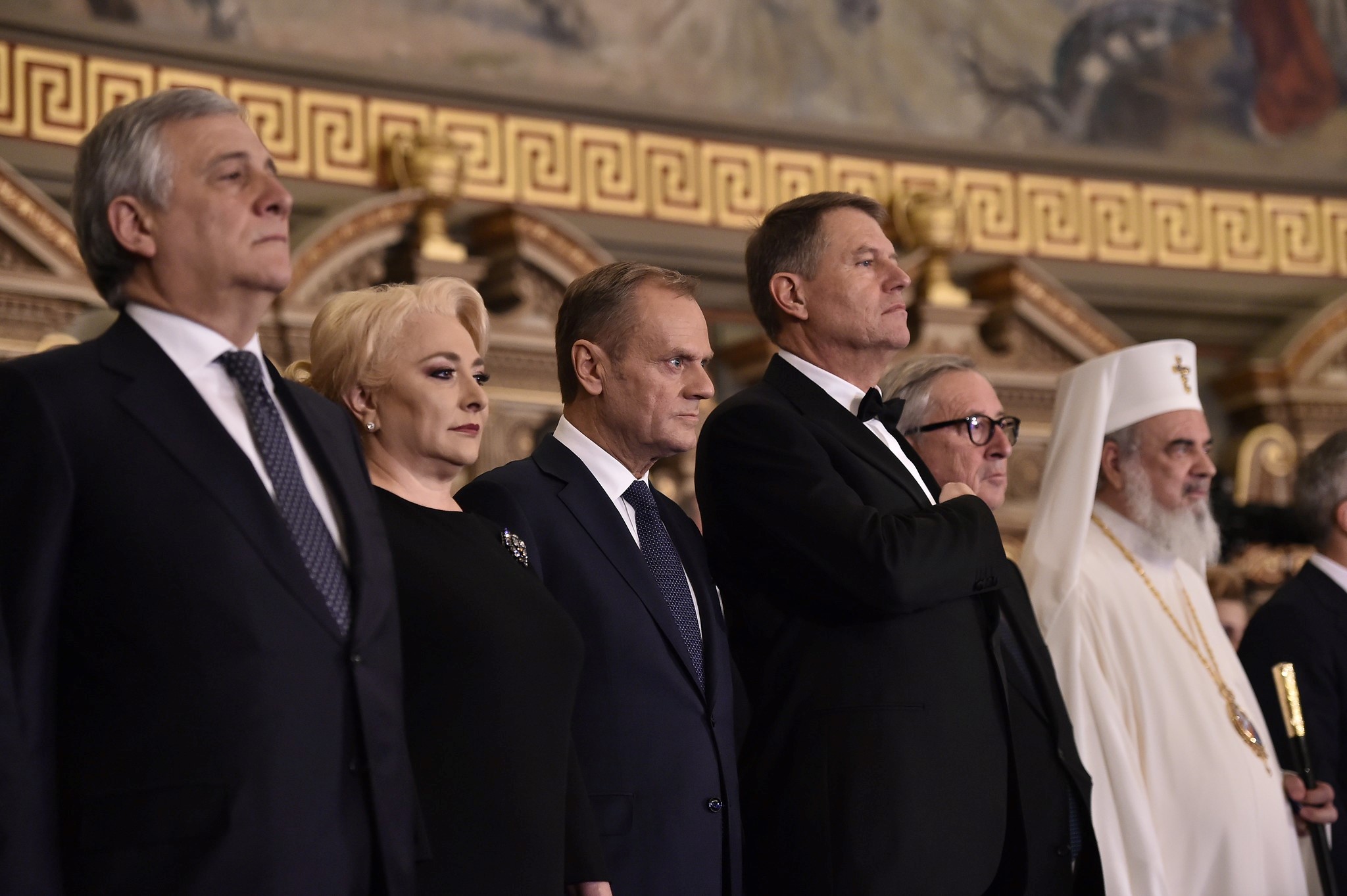 THE OPENING CEREMONY OF BUCHAREST’S EU PRESIDENCY TOOK PLACE IN A TENSE ATMOSPHERE BETWEEN ROMANIA AND THE EUROPEAN UNION. PICTURED: VIORICA DANCILA, PRIME MINISTER OF ROMANIA, DONALD TUSK, PRESIDENT OF THE EUROPEAN COUNCIL, KLAUS IOHANNIS, PRESIDENT OF ROMANIA, JEAN-CLAUDE JUNCKER, PRESIDENT OF THE EUROPEAN COMMISSION. source: ROMANIA MFA
THE OPENING CEREMONY OF BUCHAREST’S EU PRESIDENCY TOOK PLACE IN A TENSE ATMOSPHERE BETWEEN ROMANIA AND THE EUROPEAN UNION. PICTURED: VIORICA DANCILA, PRIME MINISTER OF ROMANIA, DONALD TUSK, PRESIDENT OF THE EUROPEAN COUNCIL, KLAUS IOHANNIS, PRESIDENT OF ROMANIA, JEAN-CLAUDE JUNCKER, PRESIDENT OF THE EUROPEAN COMMISSION. source: ROMANIA MFATough inauguration
No wonder that Romania’s rotating presidency was inaugurated amid strained ties, with the representatives of the European Commission reminding about rule-of-law principles and Romanian authorities saying that they know how to rule its own country. Addressing the audience at the opening ceremony, Romanian Prime Minister said her country is ready to take up new duties while calling on the fellow EU Member States to treat Bucharest as an equal partner . Romanian Senate president Calin Popescu-Tariceanu, who is known for his sharp tongue, argued that some of the country’s institutions had been last reformed before the 1989 changes, adding that Bucharest’s presidency will serve to explain the nature of these reforms, making foreign politicians abandon their erroneous conception of Romanian public life. This is how Romanian politicians responded to EU’s claims for jeopardizing the combat against corruption and Brussels’s negative assessment of judiciary reforms. In his speech delivered in Romanian, a step warmly welcomed by local officials, President of the European Council Donald Tusk warned against “cutting corners” and playing outside the agreed rules.
Bad beginnings make happy endingsA strained atmosphere prevailed while Romania was taking over its first-ever six-month presidency, with its top priorities having been immediately outlined. It is worthwhile to discuss the core ideas behind the functioning of the presidency over the European Council. Its concept goes back to the times of the European Economic Community, albeit back then it granted more opportunities to individual countries, with the country holding the rotating presidency having many privileges and playing a vital role in appointing the President of the European Council. Signed in 2009, the Treaty of Lisbon reduced the importance of the EU Council presidency, narrowing it down to nothing more than just a prestigious position. Despite all this, the “new” EU Member States see this mandate as a momentous event corroborating their position within the EU structures, but holding the EU presidency does not mean that subsequent countries to accept this function have their hands tied. The Treaty of Lisbon introduced the triple presidency model, under which three consecutive countries serving their mandate adopt a common long-term agenda to be implemented over an eighteen-month period. Before Romania kicked off its presidency, Austria held its mandate in a “troika” with Estonia and Bulgaria. Bucharest will be succeeded by Finland while Croatia is waiting to take over its six-month slot. The group will remain committed to bridging a development gap between EU countries, enhancing security, sustaining common values, and boosting the bloc’s importance outside the European Union.
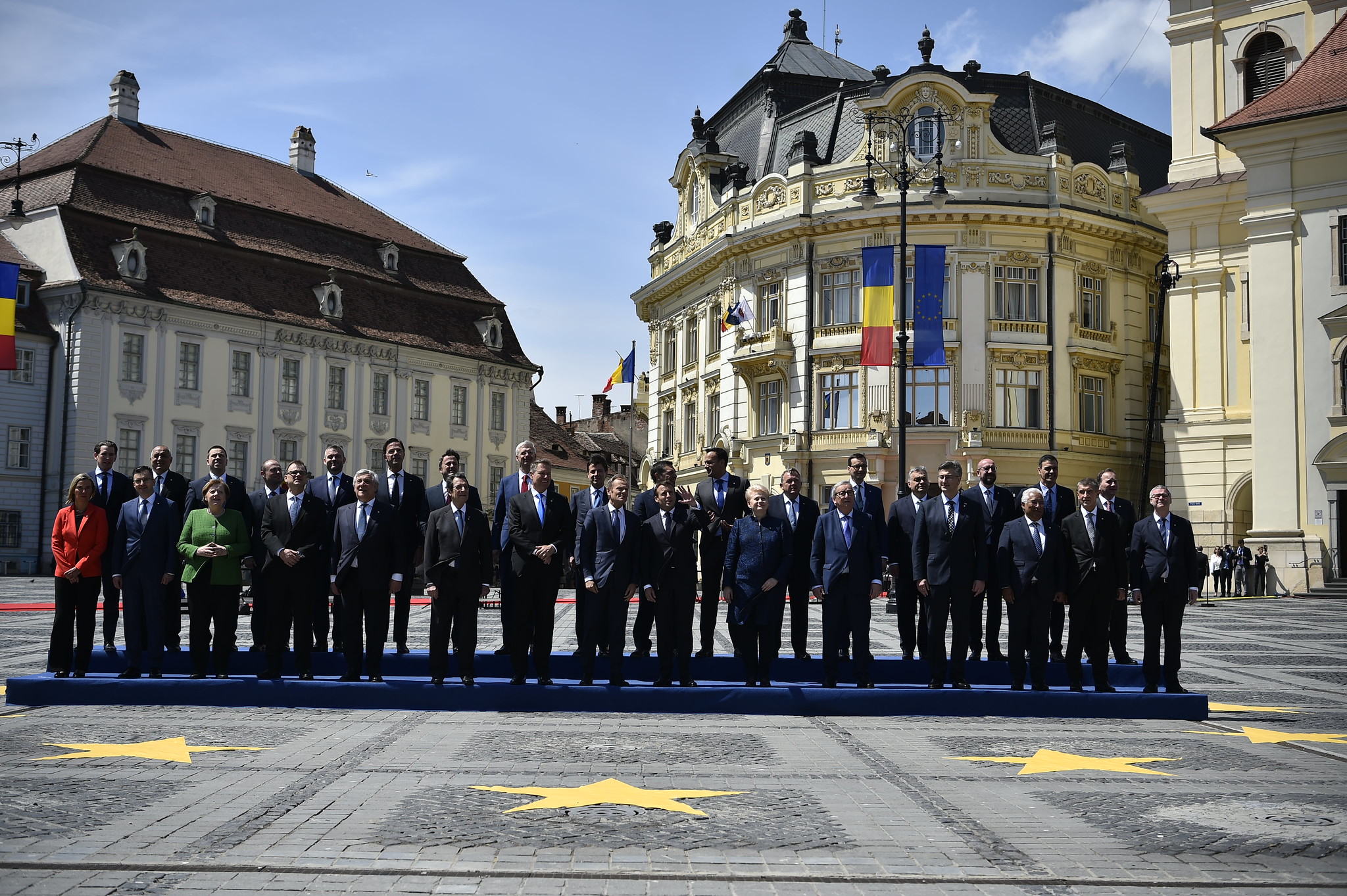 THE SUMMIT OF LEADERS IN SYBIN, ROMANIA source: ROMANIA MFA
THE SUMMIT OF LEADERS IN SYBIN, ROMANIA source: ROMANIA MFAEnergy and border security
During the six months it held the EU Council presidency, Romania successfully concluded 90 legislative dossiers that led to creating new legislation or laid the grounds for initiating longer lawmaking works. Among Bucharest’s major achievements was the adoption of the revised version of the 2017 EU directive on energy policy. Particular attention was drawn to common rules for the gas market to apply to all gas pipelines to and from third countries, with special reference to Nord Stream 2, an energy pipeline connecting Russia to Germany. As requested by Berlin, applying the directive will depend on whether such a solution is sought by the countries through whose territories Nord Stream runs, and not by the European Commission, as initially planned. But EU-wide standards shall apply up to the territorial borders of the countries of the bloc while emphasizing the need for the unbundling of gas transmission pipelines and production and supply assets. The new rules introduced an obligation to guarantee non-discriminatory tariff setting. And this strikes a blow to the Russian state-owned gas giant Gazprom that manages the Nord Stream 2 energy project. Although the EU directive cannot block the investment, it may reduce its profitability to prevent the energy infrastructure venture from becoming a tool for exerting pressure on Poland or the Baltic States.
Another decision of Romania’s EU presidency was to reinforce European borders, a solution that came amid the EU migrant crisis. A standing corps of border guards will be established by 2027 in a bid to better manage the EU external borders. A total of 10,000 operational staff will become part of the newly created body, both from the European Border and Coast Guard Agency (Frontex) and border guards from individual states. The reinforced standing corps seems now most desirable in the southern EU Member States, all of which keep grappling with the issue of mass immigration from Africa and the Middle East. And notwithstanding this, restless times we live in may quickly prompt us to find other ways to deploy such units, an example of which may be tensions running high in the conflict in Ukraine’s east. Money mattersWhat emerged as a tough challenge for Romania’s mandate at the EU presidency were further negotiations on the EU’s next long-term budget 2021-2027. Also, the EU countries successfully managed to make a push in adopting the new ten multiannual financial frameworks for different areas of activity. The proposed budget amounts to €1,135 billion, or the first of the post-Brexit era, compared to the budget framework of €1,082.5 billion for 2014–2020. The process of drawing up the EU budget is usually made up of compromises because all EU Member States need to approve it. This comes even though Eurocrats spoke in favor of the negotiations over the budget’s final draft, European peers will undoubtedly continue to work on it over the next six months.
Romanian presidency made efforts to solidify the European banking system. Bucharest’s achievements attempted to reduce risks in the financial system by reinforcing banks’ ability to manage crises, similar to the ones we experienced more than a decade ago.Ecology must wait
Recently, public debate has focused on climate changes and related dangers, a widely discussed issue over the past six months. The EU Member States agreed to cut their carbon dioxide emissions, fixing a 30-percent CO2-reduction target for buses and trucks by 2030.
Many EU countries sought far-reaching changes. But a proposal for the European Union to reach net-zero greenhouse gas emissions by 2050 failed to garner unanimity among the countries of the bloc that feared high costs of industrial transformation. In the past, many countries used to be cool about such ideas, but public pressure to tackle the climate catastrophe made more and more leaders willing to sign the document. But the Czech Republic, Estonia, Hungary and Poland refused to support the plan, pointing to a vague provision on financing industrial changes and grumbling that climate neutrality requires costly solutions. Further climate negotiations will be a task for Finland that assumed the rotating presidency of the European Union from Romania.
NEWSLETTER
The above initiatives pushed forward under the mandate of the Romanian presidency are sometimes referred to as groundbreaking. The Sibiu summit, which took place in early May this year, has brought a declaration on building EU unity, marking a particularly important step, especially ahead of the United Kingdom’s departure from the bloc.
Challenges for Romania
Romania’s EU presidency is said to have been very successful even though the state’s judiciary reform are still being under harsh criticism from the European Union. And much indicates that the situation will soon normalize. In late May, the European Parliament elections were held; while their initial results prompted a draw , it later turned out that the ruling PSD party got 22.5 percent of all votes, staying slightly behind the opposition National Liberal Party (PNL), which got 27 percent. The “anti-system” USR-Plus Alliance obtained somewhat above 22 percent of all votes, coming in third.
This places Romania’s ruling party in an uneasy situation, making it struggle both with internal problems, such as a prison sentence for its former leader Liviu Dragnea, and external ones, an example of which is the EU-Romania row over judiciary reforms. And President Klaus Iohannis inflicted another defeat to the ruling coalition with a decision to hold a referendum, along with the European elections, opening up an opportunity for Romanian people to say in a double ballot what they think about altering judicial legislation, a draft pushed through by the PSD-ALDE coalition in power. The referendum’s questions concerned a national ban on any amnesty and amending some laws. Voter turnout stood at more than 40 percent, which made the results of the referendum binding. Over 85 percent of Romanians cast a ballot in favor of the president’s proposals.
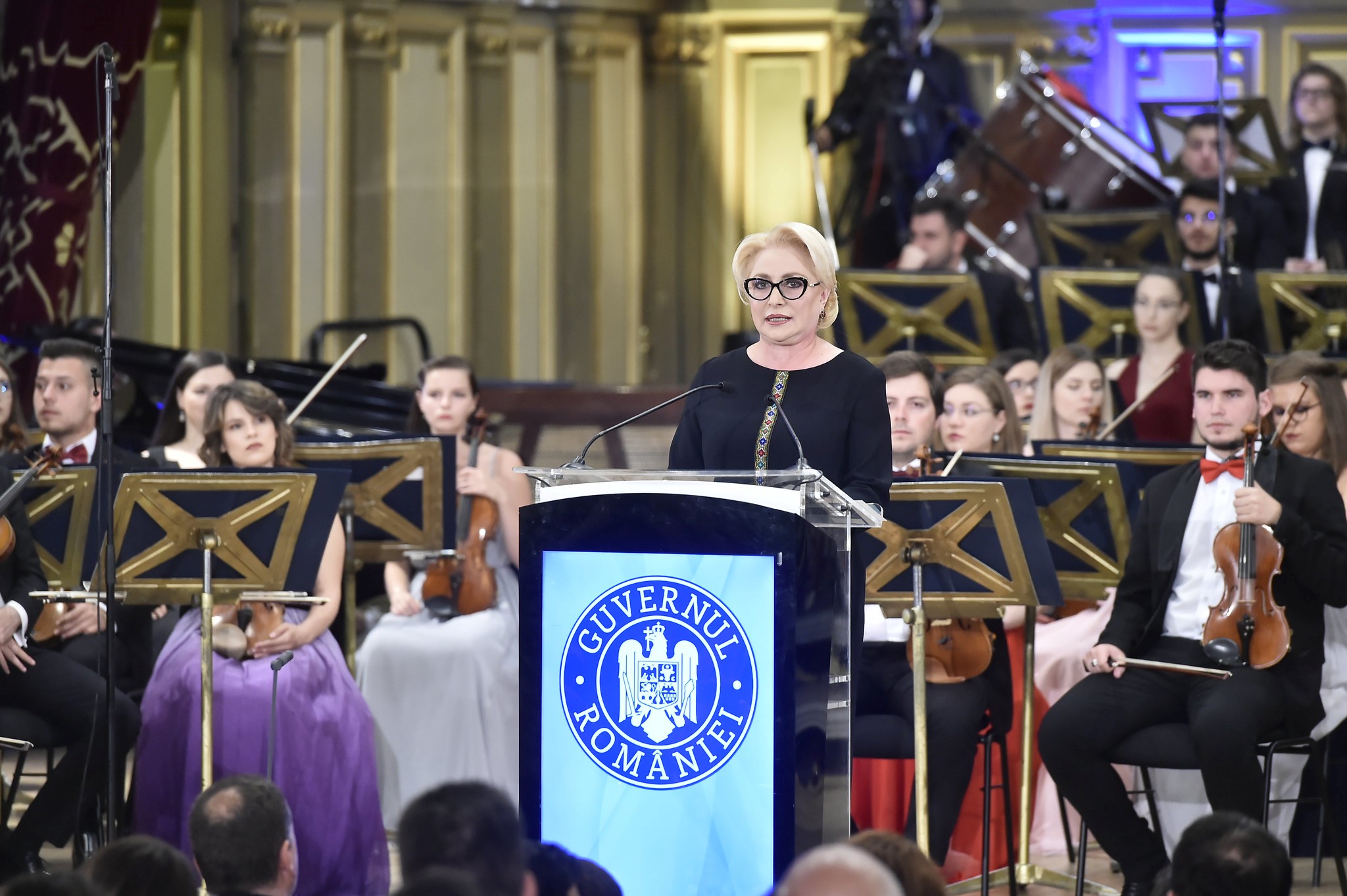
Many indications are suggesting that the PSD will have to work very hard before the next parliamentary elections to be held either in late 2020 or early 2021. In November 2019, the ruling team will get involved in an election battle with the incumbent president Klaus Iohannis as the latter is expected to run for re-election. It is, therefore, to be expected that concessions will be made in a bid to gain voters’ trust. But there has already opened up an opportunity to show what changed. Romania’s Social Democratic Party saw its former leader Liviu Dragnea having been sent to prison, a fact of which Prime Minister Viorica Dancila seems to have taken advantage, openly criticizing the policies pursued by her colleague. As part of personal reshuffles within the Romanian government in July 2019, Interior Minister Carmen Dan was relieved from her ministerial duties; earlier she had been associated with violent intervention by law enforcement during anti-government protests. This move made Viorica Dancila, considered by many as a puppet in Dragnea’s hands, show that she is capable of acting independently. For the opposition party, this, along with the remarkable success of Romania’s presidency, is however too early to celebrate.
What happened over the past six months has shown that Bucharest’s mandate reinforced the ruling team. The controversial party leader was sent behind bars, a step that helped his political group cut itself off his policies. And the referendum seems no longer valid, with the government having declared to reverse controversial changes. Having received an appraisal from the European Union, PSD politicians could show another face to Romanian voters. But it is up to the current government to what extent it will use these attributes and what political course it will follow.
The publication of the Special Report was co-financed from the funds of the Civic Initiatives Fund Program 2018.
The concept of analytical material was created thanks to co-financing from the Civil Society Organisations Development Programme 2019.
Selected activities of our institution are supported in cooperation with The National Freedom Institute – Centre for Civil Society Development.
All texts published by the Warsaw Institute Foundation may be disseminated on the condition that their origin is credited. Images may not be used without permission.





